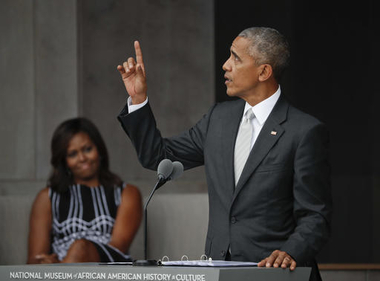Progress and struggles reflect in top race headlines of 2016

Of the many events marking the closing year of Barack Obama's time as the nation's first black president, none had deeper resonance than his opening of the National Museum of African-American History and Culture on the National Mall. Tracing the history of black America from its dark beginnings in human bondage to Obama's historic election, the museum has already welcomed more than 600,000 visitors.
"It is a monument, no less than the others on this mall, to the deep and abiding love for this country, and the ideals upon which it is founded. For we, too, are America," the president said that day in September.
The opening was a watershed cultural moment for many African-Americans, including some who lived through an era when they were unable to cast a ballot. And the highs and lows depicted within the museum's walls echoed in the progress and struggles of minorities in America during the past 12 months.
Many in the African-American, Muslim, Latino, and the LGBT communities watched this year's presidential election with alarm, as Republican candidate Donald Trump ascended to party nominee, then president-elect. Trump's rhetoric on the campaign trail — including his reference to Mexican immigrants as "rapists" and vow to build a wall on the U.S. southern border, his call for a ban on Muslims entering the country, and ominous description of "inner cities" in his pitch to black voters — was interpreted by some as racist and xenophobic.
His rallies, attended by thousands, were sometimes tainted with racial animus, and white nationalist support of the candidate prompted his Democratic opponent, Hillary Clinton, to deliver a speech on the danger of the so-called "alt-right" movement. Since the election, hundreds of racist incidents have been reported in schools and other public spaces across the country.
Still, the election also saw Nevada Democrat Catherine Cortez Masto make history as the first Latina elected to the U.S. Senate, and California Democrat Kamala Harris became the second black woman elected to the Senate.
For Americans looking for an escape from the divisive political climate, their usual refuge of sports was interrupted this year.
In January, entertainer Beyonce's Super Bowl halftime performance — where she and her dancers wore costumes in homage to the Black Panthers — was seen by some as political and militant. San Francisco 49ers quarterback Colin Kaepernick began the season by staging weekly protests against the national anthem at the start of games. Kaepernick, who is black, said his decision to kneel and not stand during the anthem was an attempt to draw attention to the issue of racial disparities in community policing.
The sports world was also cause to celebrate for many African-Americans this summer, as black women took the spotlight at the Olympic Games in Rio de Janeiro. Powerhouse gymnast Simone Biles took home four medals, and swimmer Simone Manuel became the first black woman to win an individual medal in the sport. Black women also dominated in track and field, with Michelle Carter becoming the first American woman to win gold in the shot put. Bronze medal-winner Ibtihaj Muhammad was the first Muslim-American woman to compete for the U.S. wearing a hijab.
Obama's presidency has paralleled a period of tragedy highlighted by the Black Lives Matter movement: the shootings of unarmed black men by police officers. Shootings in North Charleston, South Carolina, Baton Rouge and Minneapolis this year have stoked anger and frustration on both sides of the argument. In Dallas, the fatal shootings of five officers by a black gunman seeking revenge highlighted the divide between support for black and blue lives.
Acquittals in the trials of several officers accused of giving an injured, unarmed black man a "rough ride" in the back of a police van in Baltimore, and a mistrial in the case of Michael Slager, accused of shooting Walter Scott in the back as he fled on foot after a traffic stop in North Charleston, left open the question of whether officers will be convicted in such cases — seen as a measure of justice by some in the black community. Many viewed as a victory a federal jury's conviction of Dylann Roof, the white man who killed nine black church members in Charleston after joining with them at their weekly Bible study. Roof faces a possible death penalty and is expected to be sentenced next month.
The Orlando night club shootings that left 49 victims dead in June struck a devastating blow to the lesbian, gay, bisexual and transgender community. Many of the victims were also of Puerto Rican descent. Gunman Omar Mateen, who died in a gunbattle with police, pledged solidarity to the Islamic State group in a 911 call from the club.
Native Americans scored a win after months of protesting the building of the Dakota Access oil pipeline. As many as 5,000 people camped out on the federal land in North Dakota in solidarity with two Sioux tribes suing over the pipeline, even as heavy snow and bitter cold set in. The Army has declined to let the project move forward amid objections that it would contaminate drinking water and threaten ancient burial sites.
The deaths of boxer Muhammad Ali and Cuban dictator Fidel Castro transcended race in their impact. Ali's Muslim identity resonated with people of the faith outside of the black community, and Castro's defiant reign was interpreted in some Latin and African countries as an important part of the struggle for independence and uplift.
___
Errin Haines Whack covers urban affairs for The Associated Press.
_
Copyright 2016 The Gayly - 12/29/2016 @ 12:45 p.m.





